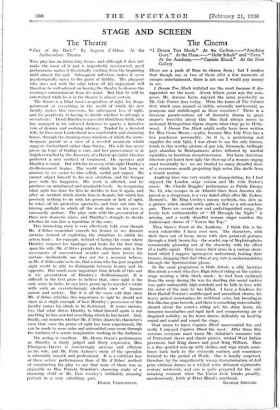STAGE AND SCREEN
Tins play has an interesting theme, and although it does not
make the most of it and is imperfectly constructed, good performance makes it theatrically exciting from the beginning until almost the end. Subsequent reflection makes it seem psychologically naive to the point of futility. The playgoer who does not wish the edge taken off his enjoyment will therefore be well advised on leaving the theatre to dismiss the evening's entertainment from his mind. But that he will be entertained while he is in the theatre is almost certain.
The theme is a blind man's acquisition of sight, his disap- pointment at everything in the world of which his new faculty makes him conscious, his subsequent loss of sight, and his perplexity in having to decide whether to attempt a second cure. Derek Huntley is a novelist blind from birth, who has managed in his enforced darkness to quarry a lucrative vein of demure and soothing whimsy. Tended by a devoted wife, he lives near Leatherhead in a comfortable and charming house, through the drawing-room windows of which the scene- designers permit us a view of a wooded mountain which suggests Switzerland rather than Surrey. His wife has never given up hope of finding a cure, and her perseverance is at length rewarded by the discovery of a Dutch specialist who has perfected a new method of treatment. He operates and Huntley is cured. But with the recovery of his sight Huntley's disillusionment begins. The world which he had been so anxious to see seems to him selfish, sordid and unjust. He cannot adjust himself to his new situation, and his temper goes with his happiness. His work is affected, and he produces an unbalanced and unsaleable book. So recognising what sight has done for him he decides to lose it again, and ufter an incident which shocks him to despair, but which has precisely nothing to do with his possession or lack of sight, he takes off his protective spectacles and trots out into the blazing sunlight in which all the work done on his eyes is summarily undone. The play ends with the presentation of three new domestic crises, and Huntley's struggle to decide whether he can face a repetition of the cure.
This interesting story is very effectively told, even though Mr. d'Abbes somewhat exceeds his licence to use discreet curtains instead of exploiting the situations to which his action leads : for example, instead of facing the scene where Huntley removes his bandages and looks for the first time upon his wife, Mr. d'Abbes permits his characters only a few movements of conventional wonder and then lowers his curtain—incidentally one does not for a moment believe, as Mr. d'Abbes asks us to do, that a man who has just acquired sight would be able to distinguish between beauty "Mid its opposite. But much more important than details of thig sort is his presentation of Huntley's disillusionment. It is
difficult in the first place to believe that, since sight is • the only sense he lacks, he can have grown up to novelist's estate
with such an overwhelmingly idealistic view of Marian nature and society. But it is all the more odd that since Mr. d'Abbes attaches this importance to sight he should not show us a single example of how Huntley's possession of this faculty causes his ideals to be destroyed. It seems curious, too, that what drives Huntley to blind himselt again is not anything he has seen but something which he has heard. And, finally, one wonders whether Mr. d'Abbes shares his character's view that, once the power of sight has been experienced, life can be made to seem calm and untroubled once more through the medium of a serene imagination working in the darkness.
The acting is excellent. Mr. Henry Oscar's performance as Huntley is finely judged and finely expressive, Miss Ffrangeon.- Davies is convincingly anxious and efficient as his wife, and Mr. Felix Aylmer's study of the specialiSt is admirably smooth and professional. It is a criticism lea of these actors' performances than of Mr. d'Abbes' method of constructing his play to say that none of them was as enjoyable as Miss Pamela Standish's charming study of a charming child or Mr. Eric Cowley's brilliantly amusing portrait in a very subsidiary part.
DEREK VERSCIIOYLE.














































 Previous page
Previous page